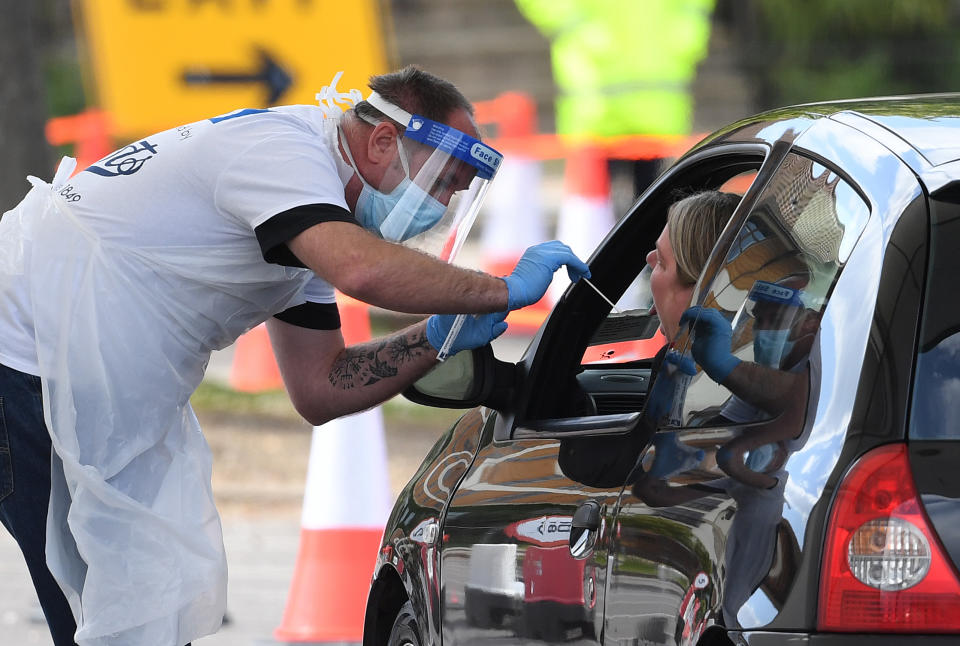Could a new 20-minute COVID-19 test mean we can have a normal Christmas?

New tests are being examined by the government, including one that gives a result in 20 minutes
Experts said rapid testing could be a big help in curbing the virus spread, but reliability and accuracy need to be established
Matt Hancock said new testing or a vaccine could allow for a ‘happy and loving’ Christmas
The government has announced new funds for rapid coronavirus testing, which it says could have a significant impact on the return to normality.
The new 20-minute tests could even allow for a “happy and loving Christmas” if the new regime “comes off”, according to health secretary Matt Hancock.
Trials in Southampton and Hampshire using a no-swab saliva check and a 20-minute test were described as “promising” by the Department of Health and Social Care (DHSC), while an ongoing experiment with repeated COVID-19 testing is also taking place.
“I hope that if this mass testing regime comes off, if the new technologies we’re working so hard on work, or if we manage to get a vaccine before now and then, then I hope we can have a happy and loving Christmas that people yearn for,” Hancock told BBC Radio 4’s Today programme.
The mass testing effort is reportedly called ‘Operation Moonshot’ in Whitehall.
Testing “brings back confidence”
Asked about the social distancing comment, and whether mass testing could prove to be a game changer, Hancock said that the use of “testing is to remove some of the restrictions that we currently have”.
He added that regular testing “allows us to have the confidence to be able to lift some of the social distancing measures and allow people to get back to normal, get back to the things they love, confident that they’re not spreading the virus”.
“So it’s about bringing back confidence, helping support people get back into work, to be able to lift some of those measures.
He added: “Short of a vaccine this is the best chance we have of reducing social distancing whilst controlling the virus, especially with winter coming, with all the challenges that brings.”
He told the BBC that the government was looking to “push” three advances in COVID-19 testing – the spit test, which is less intrusive than the swab, rapid turnaround in the processing of tests and coronavirus detection that provides instant results at home, like a pregnancy test.
Rapid testing “could be real benefit” but must be accurate
Experts have said that rapid tests need to be benchmarked next to the tests already being used.
Dr Joshua Moon, a research fellow in the Science Policy Research Unit at the University of Sussex Business School, said rapid tests are “a good thing in general” and if they are as accurate and reliable as the currently-used PCR tests they could be of “real benefit”.
But he warned: “Having a rapid test is useless if positive cases can’t or won’t isolate because support and enforcement is absent or if contacts can’t be identified because the tracing system is overwhelmed.

“As such, while a rapid test is a useful thing to have, it needs to be supported by a whole system of policies and strategies around contact tracing, case and contact isolation, support for those self-isolating, and evaluation of the system itself to ensure better functioning as the pandemic continues.”
Professor Lawrence Young, virologist and professor of molecular oncology at the University of Warwick, said that “these tests have to be thoroughly validated and benchmarked to the currently approved tests that are in routine use”.
Prof Young went on: “The hope is that a combination of these new rapid tests and the ability to use saliva (spit test) instead of swabs will result in the ability to process more tests per day and even consider the possibility of more widespread universal testing – testing individuals without symptoms to further reduce the chains of transmission.”
No ‘silver bullet’ as government plots route to normality
The World Health Organization has warned that there is no “silver bullet” in stopping the coronavirus, and insisted testing, tracing and social distancing is the main method of stopping outbreaks.
Boris Johnson has previously said he wanted to see a “significant” return to normal life by Christmas, though fears linger about a second wave occurring over winter.

The government’s plan saw bowling arenas, skating rinks and casinos reopen in August in the latest wave of England’s relaxation of COVID-19 restrictions.
Pupils are heading back to school and employees have been encouraged to return to the office.
Experiments with fans in sports grounds and trial business events were also announced.
Speaking in mid-July, the prime minister said: “What we’re saying is that we hope that by November at the earliest, if we can continue to make progress in our struggle against the virus then it may, may conceivably be possible to move away from the social distancing measures, from the one-metre rule and other things by that time.”
Coronavirus: what happened today
Click here to sign up to the latest news and information with our daily Catch-up newsletter


